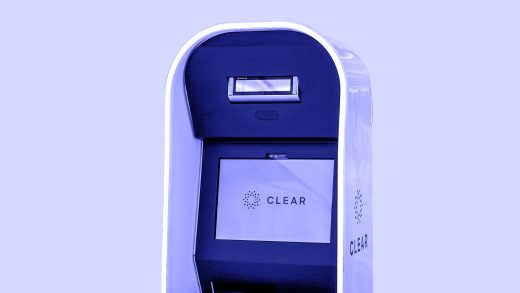California lawmakers are tired of Clear’s airport line-cutters—but airlines are not
California lawmakers are tired of Clear’s airport line-cutters—but airlines are not
A new bill would prevent Clear customers from jumping to the front of the queue at security checkpoints. But Delta, United, and other carriers aren’t on board.
BY Clint Rainey
California could become the first state to transform backlash to services offering front-of-queue privileges into a law that targets TSA line-jumpers.
The California Senate transportation committee is set to vote Tuesday on a bill seeking to bar Clear’s access to screening lanes at airports statewide. The for-profit fast-track security-screening company enjoyed an impressive stock market debut in 2021 under the banner of making travel “frictionless,” but the ride since then has gotten bumpier: Today it’s worth one-third of its peak value from two and half years ago—perhaps a sign of either consumers seeing less bang for their buck, or the public getting more annoyed at new technology that allows people to buy their way to the front of lines everywhere from airport terminals to Disney World to ski resorts.
Clear was able to create a product that made travel faster and more personalized, and leverage that as an excellent branding opportunity during an era when traveling is often hell. Today, for $189 a year, Clear members get a service that verifies their identity using biometrics, plus a smiling “ambassador” who escorts them to the head of the security line. (They must still pass through actual security; Clear merely gives them a way to bypass the travel-document-screening checkpoint.)
The service is currently available in some 50 U.S. airports, as well as a handful of big sports venues. The company has also outlined plans to expand into other industries such as hospitality, healthcare, financial services, and online shopping.
But critics argue at least the airport line-cutting part is an insult to “dignity.” As the bill’s author, California senator Josh Newman, told CBS News: “Everyone is beaten down by the travel experience, and if Clear escorts a customer in front of you and tells TSA, ‘Sorry, I have someone better,’ it’s really frustrating.”
Already, his bill is being incorrectly described as a ban on Clear. The measure would simply stop Clear members from hopping to the front of TSA’s screening lanes. Instead, they’d have to enter the terminal from their own dedicated security lane, separate from general passengers and those using TSA PreCheck.
“The bill doesn’t seek to punish Clear, or put it out of business,” Newman has explained. “It wants to create a better traffic flow so customers aren’t intersecting with the general public and causing a moment of friction that is so frustrating to the average traveler.”
Clear tells Fast Company it would actually welcome this dedicated security lane, although that isn’t an arrangement it or California has the authority to make by itself. The company left criticism of Newman’s bill to Sacramento lawmakers, but a spokesperson did tell us, “We are always working with our airline and airport partners as well as local, state, and federal governments to ensure all travelers have a safer, easier checkpoint experience,” adding that the company has led the way for years on biometrics—it introduced them at airports—and proudly partners with nine California airports, “creating hundreds of jobs, sharing more than $13 million in annual revenue with our California airport partners, and serving nearly 1 million Californians.”
Backers defend Clear by arguing that if consumers want to pay to get special airport entry and the Department of Homeland Security is okay with that, why should individual states stand in their way? It probably doesn’t help that California already bans lots of other things, from gasoline cars to the red dye in Skittles.
The bill enjoys (some) bipartisan support, and at least two heavy-hitting industry allies: flight attendants’ and TSA officers’ unions. The Association of Flight Attendants-CWA and the union representing Bay Area TSA officers both say that Clear represents a flawed pay-to-play system.
Last year, TSA called Clear’s speedy setup “vulnerable to abuse” after a man snuck through its biometrics verification system under a false name. TSA later caught him trying to smuggle ammunition into D.C.’s Reagan National Airport. In the following months, the agency reportedly uncovered at least two more lapses. Those incidents helped lead the Department of Homeland Security to require certain Clear users to present IDs to TSA agents as if they were regular old travelers.
To ensure that glitch never repeats itself, Clear told Fast Company it began rolling out a new system called Next Gen Identity+ late last year. For a minute, that switchover appeared to worsen things; frustrated Clear users took to Reddit and social media to complain that using Clear was suddenly taking longer than waiting in the regular TSA line. But the new system swaps fingerprint or iris scans for iPhone-style face scans that are 40% faster than before, with an aim of eventually allowing travelers to pass through the document-screening stage without breaking stride in this “lane of the future.”
Meanwhile, Clear’s own support network is pretty large. The major airlines are not fans of California’s bill: In a letter, Delta, United, Southwest, JetBlue, Alaska, and Hawaiian said they support Clear’s continued presence at terminals, noting that not only does the service help process airport travelers expeditiously, but also Clear pays $13 million worth of California airport fees. No more Clear would mean those fees could become their responsibility, and that might “further increase air carrier operating costs in the state,” they warn, “potentially resulting in increased fares or decreased service options.”
ABOUT THE AUTHOR
(23)



